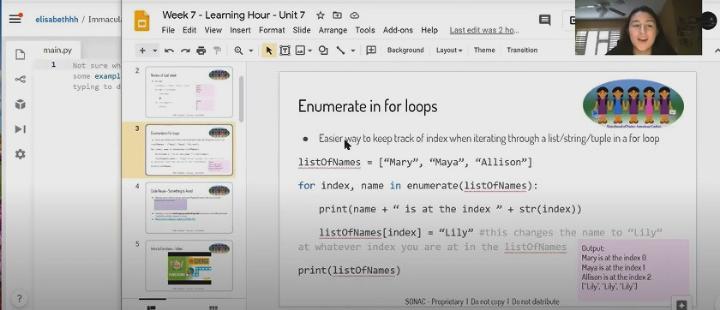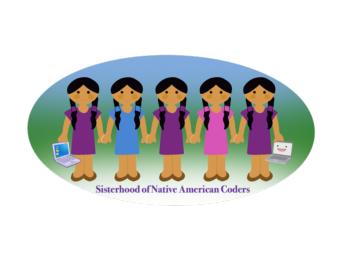 |
Canku Ota
|
 |
|
(Many Paths)
|
||
|
An Online Newsletter
Celebrating Native America
|
||
|
OCTOBER 2020 - Volume
18 Number 10
|
||
|
|
||
|
'It completely Exploded':
La Jolla Teen Sees Rapid Growth In Her Sisterhood Of Native American
Coders
|
||
|
by Elisabeth Frausto
- LaJolla Light staff writer
|
||
In just a few months, La Jolla teenager Elisabeth Holm has seen her nonprofit Sisterhood of Native American Coders grow immensely in her effort to encourage girls of indigenous heritage to learn about coding. Elisabeth, a 16-year-old senior at The Bishop's School who is heavily involved in the school's robotics team and computer science track, began SONAC in her junior year to "get young Native American girls engaged in STEM [science, technology, engineering and math]." SONAC had a "semi-slow start," Elisabeth said. But soon, news of the organization spread via social media, websites and word of mouth. "In the span of one [midsummer] week, it completely exploded," she said. SONAC now counts girls from 24 states and 59 tribal affiliations among its 81 members. Elisabeth said she designed SONAC for Native American girls ages 9-12 to "really get them interested in STEM and allow them to see how much they can do with it." Coding is the process of creating instructions for computers using programming languages. SONAC features three different components, each meeting weekly online via Zoom. The Learning Hour consists of "the main coding lessons" from curriculum and materials Elisabeth creates and teaches herself, using the coding language Python, she said. There also are "office hours" in which girls can ask questions. The third component involves mentors and guest speakers. SONAC is more than just a coding program, Elisabeth said. "It's empowering them, giving them life skills they can use as they go into STEM." The mentors and speakers are "accomplished indigenous women in STEM who have done some really cool things," she said. SONAC is free to join, with Elisabeth funding much of it from her savings. "I wanted to be sure I had a success model before seeking grant funding to expand," she said. Girls don't need coding experience to join, Elisabeth said. "We start with the very basics; all they need is access to a computer and internet."
Elisabeth founded the nonprofit to help Native American girls because her late grandmother had "indigenous ancestry to the Hopi tribe," she said. "She helped raise me and she installed a lot of those values of respecting your elders and community value, which is why I called it Sisterhood of Native American Coders." "I think Native Americans are often ignored or overlooked when thinking about minorities," she said. "Even among minorities, they are the minority. I wanted to give resources to that group that often doesn't get them." Running SONAC also honors her grandmother's legacy of generosity, Elisabeth said. "She grew up in the Great Depression. She came from very humble beginnings. A lot of the times, she would cook you food; that was her way of being generous and offering what she could to show her love. "I wanted to carry on that generosity through what I could, which was my knowledge of coding. That's why we try to make it as accessible as possible. We really want to have that open-arms policy." SONAC member Mahate, a 9-year-old who lives in Colorado, said in a video Elisabeth provided that she likes to "meet other Native American girls and learn how to code with them." Member Skye, 11, who lives in Oklahoma, said she hopes to "use code in a positive way to … create something fun and cool." Elisabeth's interest in STEM started the summer before sixth grade when she was selected for Qcamp, presented by Qualcomm and WiTech (Women in Technology). "It was an all-girls camp," she said. "Through that, I got more interested in robotics and coding." Elisabeth, who in the years since completed a research internship at the San Diego Supercomputer Center working on machine-learning projects and became a member of the MIT Online Science Technology & Engineering Community, said there are many benefits to girls in learning to code. "A lot of STEM requires a set of skills that can be applied widely," she said. "You need to be able to break down problems and work in teams. I think a lot of skills that you naturally gain from coding and robotics you can use in the workplace." "Coding is a really, really powerful tool," she added. "Knowing how to code is going to be really essential, especially in the evolving tech world." Running SONAC has been "kind of hectic in the middle of my senior year. It's hard to manage everybody across a virtual platform," said Elisabeth, who is looking to apply to universities with strong computer science programs. However, she said, it's all "worth it" as she sees many of the girls gain confidence. "They've gained a lot of enthusiasm for code. I'm very excited to see this new generation of indigenous women taking over the STEM field. Just knowing I was able to make some sort of impact on these girls' lives is very rewarding." SONAC member Suvi, a 10-year-old Minnesota resident, said in the video that in addition to coding, she's learned "that you gotta work hard for what you want." Elisabeth said she hopes SONAC will keep growing because "until indigenous girls have equal representation in STEM, I don't think our work is done." For more information, visit sisterhoodofnativeamericancoders.org. |
||||
|
|
|
|
||
|
|
||
| Canku Ota is a free Newsletter celebrating Native America, its traditions and accomplishments . We do not provide subscriber or visitor names to anyone. Some articles presented in Canku Ota may contain copyright material. We have received appropriate permissions for republishing any articles. Material appearing here is distributed without profit or monetary gain to those who have expressed an interest. This is in accordance with Title 17 U.S.C. Section 107. | ||
|
Canku Ota is a copyright ©
2000 - 2020 of Vicki Williams Barry and Paul Barry.
|
||
 |
 |
|
|
The "Canku
Ota - A Newsletter Celebrating Native America" web site and
its design is the
|
||
|
Copyright ©
1999 - 2020 of Paul C. Barry.
|
||
|
All Rights Reserved.
|
||

